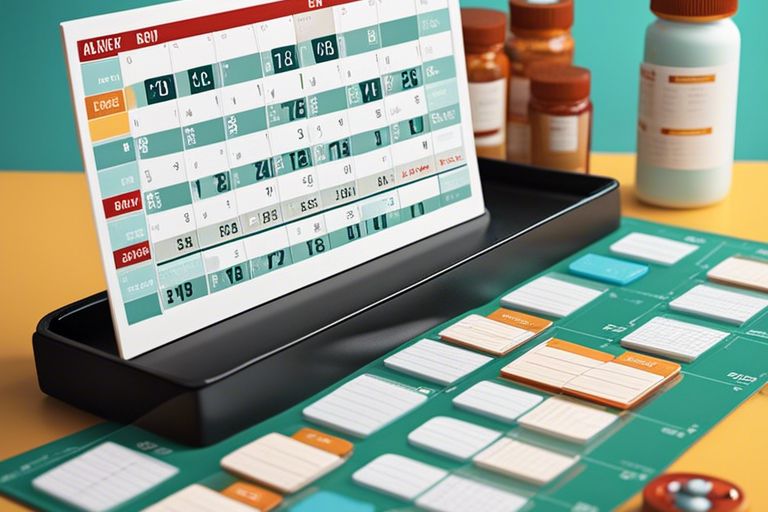
Overlooking a simple medication schedule can have serious consequences for the elderly. As individuals age, managing multiple medications can become complicated, leading to missed doses, incorrect timing, and potential interactions. A clear and easy-to-follow medication schedule is crucial in ensuring that elders take their medications properly, maintain their health, and prevent any adverse effects. Let’s explore the importance of a simple medication schedule for the well-being of our seniors.
Key Takeaways:
- Consistency is Key: Elderly individuals benefit greatly from a simple medication schedule that is easy to follow and maintain.
- Prevents Medication Errors: Simplifying medication regimens reduces the likelihood of mistakes, such as missing doses or taking incorrect medications.
- Improves Adherence: A straightforward medication schedule helps elders stay on track with their treatment plan, leading to better health outcomes and quality of life.

The Complexity of Medication Management
For Managing Medications for Seniors: 8 Essential Tips, the complexity of medication management for elders can be overwhelming. With multiple prescriptions and dosages to keep track of, it’s crucial to establish a simple and effective medication schedule to prevent confusion and potential errors.
Multiple Prescriptions and Dosages
Multiple prescriptions and dosages can lead to confusion and the risk of missing or doubling up on medications, which can have serious consequences for elders. A simple medication schedule can help ensure that each medication is taken at the right time and in the correct dosage, reducing the likelihood of errors and promoting better overall health.
Potential Interactions and Side Effects
Side effects and potential drug interactions are significant concerns when managing multiple medications. Some medications can have dangerous interactions when taken together, while others may cause positive or negative side effects. It’s necessary for caregivers and healthcare providers to be aware of these possibilities and to monitor elders closely for any signs of adverse reactions.
Interactions between medications can sometimes be unpredictable, and even seemingly harmless combinations can have harmful effects. Elders may be more susceptible to these interactions due to age-related changes in metabolism and organ function. Regular communication with healthcare providers and pharmacists is crucial to identify and address any potential issues that may arise.
The Challenges Faced by Elders
Even though aging is a natural process, it comes with its set of challenges. These challenges can make it difficult for elders to manage their medication schedule effectively, leading to potential health risks.
Cognitive Decline and Memory Loss
Any decline in cognitive function or memory loss can pose a significant challenge for elders when it comes to adhering to a medication schedule. Forgetting to take medications or taking the wrong dosage can have serious consequences on their health. It is necessary to have a simple and clear medication schedule in place to help elders stay on track with their medications and prevent any harmful effects of missed doses.
Visual Impairments and Difficulty Reading Labels
Loss of visual acuity is common among the elderly population, making it challenging for them to read small print on medication labels. This can lead to confusion about dosage instructions and potential medication errors. It is crucial to ensure that medication labels are clear, concise, and easily legible for elders to avoid any misunderstandings that could jeopardize their health.
The Risks of Non-Adherence
Once again, let’s explore the critical risks associated with non-adherence to a medication schedule among the elderly. Failure to adhere to a prescribed medication regimen can have severe consequences, leading to various health complications and deteriorating overall well-being.
Increased Hospitalization Rates
One of the most significant risks of non-adherence is the increased likelihood of hospitalization among the elderly. Missing doses or taking medications incorrectly can worsen existing health conditions, leading to medical emergencies that require immediate attention in a hospital setting. Elderly individuals who do not follow their prescribed medication schedule are at a higher risk of adverse reactions, disease progression, and exacerbation of symptoms, ultimately resulting in more frequent hospital visits.
Decreased Quality of Life
The consequences of non-adherence extend beyond physical health and can significantly impact the overall quality of life for the elderly. Failure to take medications as directed can lead to a decline in cognitive function, mobility, and independence, affecting daily activities and social interactions. In addition, untreated symptoms due to medication non-adherence can cause pain, discomfort, and emotional distress, further diminishing the elderly individual’s quality of life.
Risks: It is crucial to emphasize the importance of a simple medication schedule for elders to prevent the detrimental effects of non-adherence on their health and well-being. By highlighting the risks associated with failing to follow prescribed medication regimens, we can raise awareness and promote better adherence practices among the elderly population.
The Benefits of a Simple Medication Schedule
Many elders struggle to keep track of their medications due to complex schedules, which can lead to missed doses and potential health risks. Implementing a simple medication schedule can offer various benefits that improve overall health outcomes and quality of life for seniors.
Improved Adherence Rates
Simple medication schedules are easier for elders to follow, leading to improved adherence rates. When the dosing instructions are clear and straightforward, individuals are more likely to take their medications as prescribed, reducing the risk of complications and hospitalizations.
Reduced Risk of Adverse Events
Adherence to a simple medication schedule can significantly reduce the risk of adverse events, such as medication errors or drug interactions. These events can be life-threatening for older adults, making a clear and easy-to-follow schedule crucial for their well-being.
This ensures that seniors are taking the right medications at the right times, minimizing the chances of experiencing dangerous side effects or complications.

Strategies for Simplifying Medication Schedules
Now, when it comes to simplifying medication schedules for elders, there are several practical strategies that can be implemented to ensure adherence and effectiveness. According to a study on the Outcomes of a Non-Randomized Pilot and Feasibility Study, one of the most effective ways to streamline medication management is by using pill boxes and reminders.
Pill Boxes and Reminders
For elders who struggle with managing multiple medications, using pill boxes can be a game-changer. These boxes organize medication by day and time, making it easy to track which pills have been taken and which ones are still pending. Additionally, setting up reminders on smartphones or watches can further assist in ensuring that medications are taken on time.
Enlisting the Help of Caregivers or Family Members
Pill management can become significantly more manageable when caregivers or family members are involved in the process. It is crucial to have a reliable support system in place to oversee medication intake and provide timely reminders if needed. By delegating some of the responsibility to a trusted individual, elders can feel more at ease and confident in their medication routine.
Enlisting the help of caregivers or family members can also serve as a safety net in case of any confusion or missed doses. Regular communication and collaboration between the elder and their support system are key to maintaining a simple yet effective medication schedule.

Overcoming Barriers to Simplification
Not all elders may easily adapt to a simple medication schedule due to various barriers. These barriers can include cost concerns, managing complex regimens, forgetfulness, and more. Addressing these barriers is crucial to ensure that elders can effectively follow their medication schedules.
Addressing Cost Concerns
Barriers such as the high cost of medications can prevent elders from simplifying their medication schedules. Older adults on fixed incomes may struggle to afford multiple prescriptions. In such cases, working with healthcare providers to find generic or more affordable options can help in simplifying the medication regimen.
Managing Complex Regimens
Barriers related to managing complex regimens can be daunting for elders. Some may have multiple medications to take at different times of the day, leading to confusion and potential missed doses. Simplifying the regimen by consolidating medications, using pill organizers, or setting reminders can greatly improve adherence.
Plus More
Plus, educating elders on the importance of adhering to their medication schedule and the potential consequences of non-adherence can motivate them to simplify their regimens. Additionally, involving family members or caregivers in managing medications can provide extra support and ensure elders stay on track with their schedule.
Conclusion
From above, it is evident that a simple medication schedule is important for elders to ensure they take their medications correctly and manage their health effectively. By organizing their prescriptions in an easy-to-follow routine, seniors can avoid missed doses, minimize the risk of medication errors, and maintain their overall well-being. Following expert advice on medication management for seniors, such as the tips and strategies discussed in Medication Management for Seniors: Tips and Strategies, can help elders stay on track with their medications and lead healthier lives.
FAQ
Q: Why is it important for elders to have a simple medication schedule?
A: A simple medication schedule is vital for elders to help them manage their medications accurately and consistently, reducing the risk of medication errors and complications.
Q: What are the common challenges elders face with medication management?
A: Elders often face challenges such as memory issues, vision problems, dexterity issues, and confusion, making it difficult for them to keep track of their medications.
Q: How can a simple medication schedule benefit elders?
A: A simple medication schedule can help elders stay organized, remember to take their medications on time, and ensure they are following the correct dosage instructions.
Q: What are some tips for creating a simple medication schedule for elders?
A: Some tips include using pill organizers, setting reminders, keeping a medication list, and involving a caregiver or healthcare provider in the process.
Q: How can a simple medication schedule help prevent adverse drug interactions in elders?
A: By following a simple medication schedule, elders can reduce the risk of mixing medications that may cause harmful interactions, protecting their health and well-being.
Q: What are the consequences of not having a proper medication schedule for elders?
A: Without a proper medication schedule, elders may forget to take important medications, take incorrect dosages, or double dose, leading to serious health complications and hospitalizations.
Q: How can caregivers support elders in maintaining a simple medication schedule?
A: Caregivers can support elders by assisting with organizing medications, providing reminders, monitoring adherence, and communicating with healthcare providers about any concerns or changes in medication needs.


No Comments